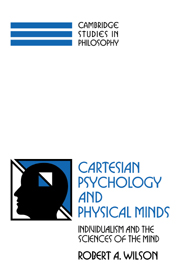Book contents
- Frontmatter
- Contents
- Preface
- 1 Introduction: What is individualism in psychology?
- PART I ON ARGUMENTS FOR INDIVIDUALISM
- 2 An a priori argument: the argument from causal powers
- 3 An empirical argument: the computational argument
- 4 Methodological arguments
- PART II PSYCHOLOGICAL EXPLANATION AND MENTAL CAUSATION
- PART III THE CASE AGAINST INDIVIDUALISM
- References
- Index
2 - An a priori argument: the argument from causal powers
Published online by Cambridge University Press: 05 June 2012
- Frontmatter
- Contents
- Preface
- 1 Introduction: What is individualism in psychology?
- PART I ON ARGUMENTS FOR INDIVIDUALISM
- 2 An a priori argument: the argument from causal powers
- 3 An empirical argument: the computational argument
- 4 Methodological arguments
- PART II PSYCHOLOGICAL EXPLANATION AND MENTAL CAUSATION
- PART III THE CASE AGAINST INDIVIDUALISM
- References
- Index
Summary
In the Introduction we saw that much of the appeal of individualism derives from intuitive general views about explanation, causation, and causal powers. These views are the basis for an influential argument for individualism developed by Jerry Fodor (1987:ch. 2) that claims that individualism in psychology follows from the nature of scientific explanation. Its central claim is that scientific taxonomies satisfy a general constraint of which individualism in psychology is a particular instance.
STATING THE ARGUMENT
The argument can be summarized as follows. Sciences typically individuate their explanatory categories and kinds by causal powers, and the causal powers that anything has supervene on that thing's intrinsic physical properties. So, if psychology is to be a science, mental states must supervene on the intrinsic physical properties of individuals; thus individualism is a constraint on psychology.
Both those who have criticized this argument as unsound (Braun 1991; Egan 1991; van Gulick 1989) and those who have been more sympathetic to it (Crane 1991; McGinn 1991; Owens 1993; Williams 1990) have assumed that the argument is at least valid. I shall argue, by contrast, that this argument for individualism equivocates on ‘causal powers’, and that this equivocation is not simply inherent in a particular formulation of the argument. Rather, the equivocation points to a deep and recurrent problem for those who claim that individualism in psychology follows from generally acceptable claims about explanation, causation, and causal powers.
- Type
- Chapter
- Information
- Cartesian Psychology and Physical MindsIndividualism and the Science of the Mind, pp. 31 - 60Publisher: Cambridge University PressPrint publication year: 1995



